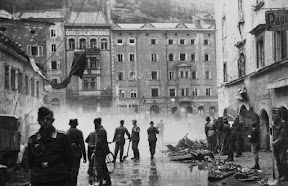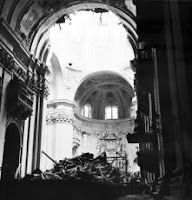3500 negatives from Robert Capa's series of photographs on the Spanish Civil War have been found in Mexico. After being considered as lost for 70 years, the circle has been closed, and we might end knowing something more about some of his most famous pictures.
Robert Capa, born in Budapest in 1913 as Endre Ernő Friedmann, was one of the greatest photographers in the 20th century. His most famous picture might well be "Spanish Loyalist", taken near Cerro Muriano, in Córdoba, depicting the death of a Loyalist Militiaman after being shot by Fascist machine-gun fire.
The proximity to the subject, the perfect exposure and timing, the angle... rose doubts about the authenticity of the picture. Some said Capa staged the death of the Loyalist. Until 1995, when a certain Mario Brotóns Jordà published his memoirs on the Spanish Civil War. Brotóns, himself a veteran of the Córdoba front, recognised the leather bullet pouches in Capa's photograph that were made in that fashion only in Alcoy, and that only the militiamen from Alcoy carried. Based on other indications on Capa's photograph, it could be dated to 5 September, and Brotóns found in the archives that the only militiaman from Alcoy who was killed on 5 September 1936 on the Córdoba front was Federico Borrell García. Brotóns traced a surviving brother of the deceased soldier and showed him the photograph. The brother was able to recognise Federico on the picture. Capa's "Loyalist" really did fall in battle.
Who knows what will these lost and found negatives tell us about the circumstances, about the people, about the dreams, about the nightmares of a whole generation. Capa said once "If your pictures are no good, you didn't get close enough", meaning by that not only the physical but also the emotional proximity with the subjects required to produce a really great photograph.
But there is yet another quote from Robert Capa that I really love. He said once, in an interview with the World Telegram: "No tricks are necessary to take pictures in Spain. You don't have to pose your camera. The pictures are there, and you just take them."
Monday 28 January 2008
Lost & found
Saturday 19 January 2008
Sounds of destruction
Every Saturday, exactly at 12:00 a.m., the city alarms of Salzburg (and, apparently, those of every city and town in Austria) are tested for half a minute. Their sound, loud and continuous, always remembers me of air raid alarms. It might well be that they are the old WWII bomb alarms, reused as city sirens...
Salzburg survived the end of World War II relatively well. Its geographical situation, deep into the then-German Reich, kept it out of the reach of Allied bombers well until the death of Mussolini. But its relative strategic unimportance, when compared to more industrial cities like Hallein, Linz or Graz, let it remain mostly ignored even when the Allies where already in Italy.
The bombing raids over Salzburg (with a total of 15) started on October 1944. People would have to run into the city hills, Kapuzinerberg and Festungsberg, into the underground shelters. The Hexenturm (Witches' Tower), part of the old military defenses, not far away of present-day Schrannenmarkt, was literally wiped out. One of the city's water reservoirs, up on the Mönchsberg, was destroyed as well, adding flood to the existing chaos. A bomb even entered the Baroque cathedral, perforating the dome, but it did not explode. Some say Virgin Mary made a miracle...

I learned about the air raids over Salzburg in a book that I catched some time ago, an autobiography of playwright Thomas Bernhard, who happened to spend his childhood in Salzburg during WWII.
Fortunately, I have never found myself in a bombing raid, and I do not know how would I act. I think fear would completely paralyse me, but I hope I never know. What I do know is that the only thing that is left is destruction, stillness, emptiness. But we humans do not seem to learn the lesson.
The famous view from the Dresden City Hall Tower comes to my mind. Or the ghostly quietness of the Old Town of Belchite, destroyed by Francoist troops during the Spanish Civil War and kept untouched as a tribute and as a warning.
I hope I'll never know how it feels to walk through the streets of your home town after being destroyed. But I guess it may feel like walking through a forest after a fire. That is an image I for sure will never forget. It was in Vespella, near Tarragona. I had ridden my bicycle to the top of a hill, and at the other side there was nothing but desolated moon landscape for as long as my eyes could reach. Tortured black tree corpses everywhere. Ashes. The smell. The unnatural stillness. Destruction. Absolute emptiness.
Tuesday 8 January 2008
The Dead Nights
The innkeeper was cleaning beer mugs as he looked at the darkness through the window. Outside, the snowstorm showed no trace of abating.
The door opened suddenly, letting wind and snow howl into the room. The torches tilted for a while before lighting the tall, horned and hairy monster that burst into the inn.
- Are you already here? -asked the inn owner. - You don't fear a thing, do you?
Covered by a cloak, a stranger looked up from a dark corner beside the fireplace.
The monster walked on its feet and carried a huge club in its claws. It growled affirmatively while it shook the snow off of its fur.
- No, we are not letting bad weather disturb our mission -the monster said as it brought its claws behind its head-. There is no excuse for not carrying on our duty on the Twelve Nights.
The monster lifted the heavy horned mask and let the head of a youngster appear. He would be some eighteen years old and tall and burly. The stranger smoked slowly from his pipe as the youngster put the dreadful mask on a table and the innkeeper served him a pint.
- I used to have a mask like yours when I was younger -the stranger said, putting down the hood of his cloak. The pale light coming from the fireplace lit the face of an old man. Grey were his hair and his beard, and his eyes shone in an odd way. The youngster, curious, approached the old man.
- Long, long ago I used to be the best-known Schiachpercht in the shire where I lived. I would not have been afraid of a snowstorm like this. -The old man had a very deep voice, as if it came from the very bowels of the earth. -To scare away the evil spirits hanging around on the Dead Nights is too important a job.
- ¿Dead Nights? ¿Do you mean the Twelve Nights? -the youngster asked.
- Indeed, -the old man sat up- the twelve nights remaining after twelve lunar months to complete a solar year. The nights when the goddess Berchta runs around the mountains, when darkness covers everything, when the line between living and dead is so fragile that one hardly can tell the difference. And that's why we have to put on fearsome masks to scare evil away, for on these nights they fly around our towns.
- Yes -the youngster nodded proudly-, and I am the one Schiachpercht that always runs after evil spirits the farthest, even deep into the woods. I am the only one. The others have no guts.
The innkeeper rolled up his eyes, used to his braggings.
- The border between braveness and stupidity is quite difficult to tell -the old man replied with an undecipherable smile. -You ought to respect the woods. Some of the beings that dwell there are not easy to scare away, even with a mask like yours.
The old man closed his eyes and let the smoke from his pipe slowly out of his mouth. The youngster remained silent as the old man began to tell his story.
- There is an old tale where I come from, telling the story of a Schiachpercht who, like you or like me, used to go out with his mask on the Dead Nights. He, too, had no fear when chasing evil spirits deep into the woods.
The old man took a deep breath before going on.
- It is said that in the middle a snowstorm night he went alone into the woods and found a lake of dark waters he had never heard of. He was there ambushed by wood goblins who awoke with their cries and laughs an old and powerful evil spirit that slept in the water. In order to save his life, the young man sealed a pact with the spirit, turning into a lycanthrope, a werewolf...
- I don't believe in werewolves! -laughed the youngster. The old man looked at him with fiery eyes, irritated at the interruption.
- The villagers, worried for the missing young man, parted to search for him. On the second night, his mask was found, broken and covered with blood. On returning to the village with the mask, they were hunt down by a creature of the night, from whose fierce attack only one man was able to escape. Badly wounded, he made it into the village to explain, briefly before exhaling his last breath, that the horror the group found walked on its feet as a human but it turned into a wolf to attack them. That two-legged creature wore the clothes of the missing young man.
- It's a good story to scare children, but werewolves don't exist -the youngster insisted.
- The biggest triumph of the Devil is to make us doubt his existence -the old man replied.
- Nonsense -the youngster drank up his pint. -I still have a lot to do tonight. It's been nice to meet you, but I cannot stay for any longer here with your tales. The woods are waiting for me -the youngster said. He threw a coin over the counter and put his mask on again.
- Good hunt, young Schiachpercht -the old man smiled.
- You too, stranger -the youngster replied, his voice distorted behind the mask.
An icy wind blew again into the room as the youngster walked out. It did not snow any more. The old man stayed for a while beside the fire. As he finished his pint, he wrapped himself with his cloak, bid farewell to the innkeeper and walked out the room.
The innkeeper shook his head and continued cleaning beer mugs. As he looked around the room, he realized that the old man had forgotten his pipe on the table. With a sighing, he picked it and went outside to see if he could still catch him.
The old man's cloak laid empty on the virgin snow, the full moon illuminating it briefly between the clouds. The sceptic innkeeper looked around and he thought he saw the dark silhouette of a wolf, running into the darkness of the woods.

 versión en español
versión en español






